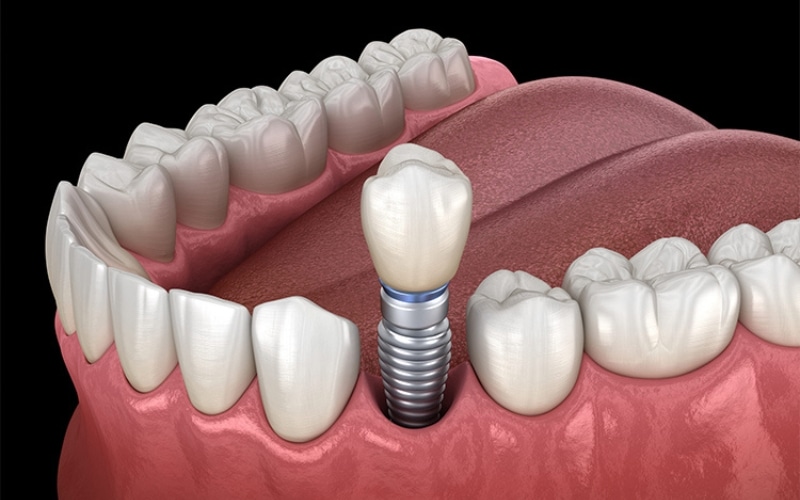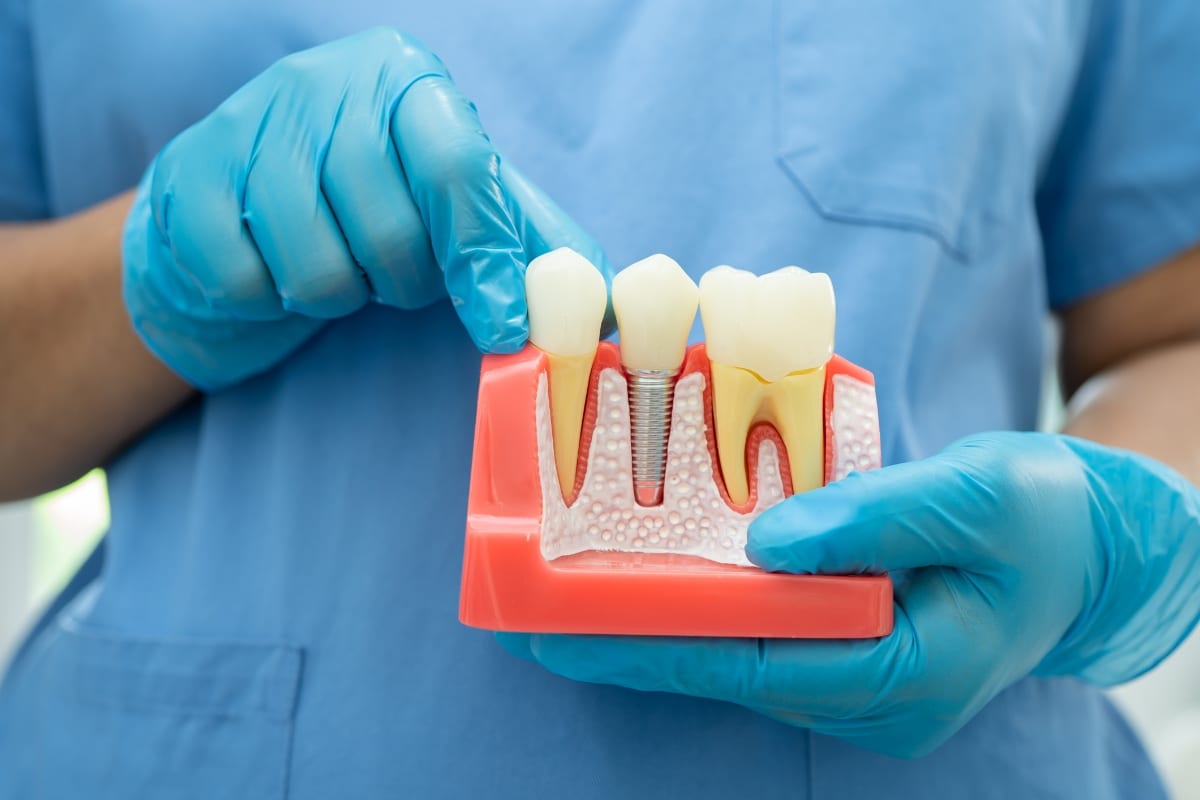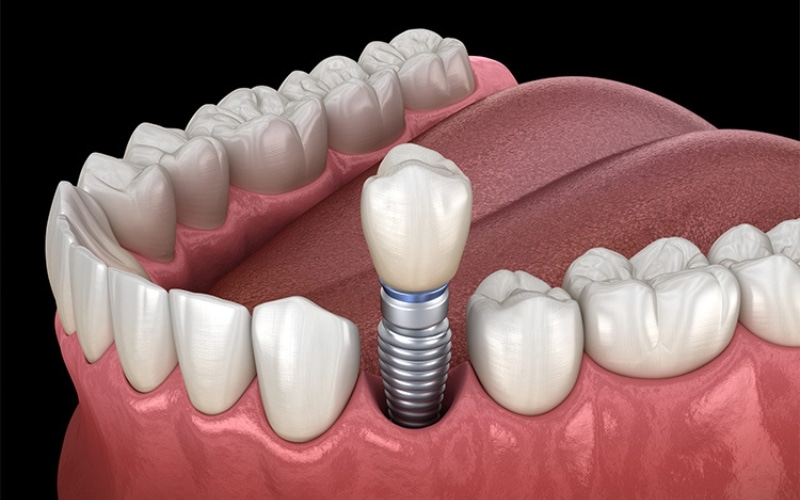New Patients Welcome!

Oral health is an integral part of our overall well-being, but for individuals living with diabetes, it can present unique challenges. Diabetes affects nearly every aspect of the body, including the mouth. Among the concerns faced by diabetics, dental implants often raise questions and concerns. In this blog post, we’ll delve into the world of dental implants for diabetics, exploring the challenges, considerations, and practical tips for maintaining good oral health.
Understanding Diabetes and Oral Health
Diabetes is a complex condition characterized by elevated blood sugar levels, which can lead to various health issues, including complications in oral health. Individuals with diabetes are more prone to:
1. Gum Disease (Periodontitis)
Diabetics are at a higher risk of developing gum disease due to elevated blood sugar levels, which can weaken the body’s ability to fight bacteria. Gum disease can lead to tooth loss, which is where dental implants become relevant.
2. Dry Mouth (Xerostomia)
Some medications used to manage diabetes can cause dry mouth. Saliva plays a crucial role in maintaining oral health by neutralizing acids and helping to wash away food particles and bacteria. A dry mouth can increase the risk of dental problems, including tooth decay and infections.
3. Delayed Healing
Diabetes can slow down the body’s ability to heal after surgery, including dental implant procedures. This requires special attention during the implant process.
Dental Implants: Are They Suitable for Diabetics?
Dental implants have emerged as a revolutionary solution for replacing missing teeth and restoring smiles. However, for individuals managing diabetes, the question of whether dental implants are a viable option often arises. Let’s delve deeper into this important consideration, exploring the intricacies that diabetics should be aware of.
Blood Sugar Control
One of the fundamental prerequisites for considering dental implants in Ventura, as a diabetic is well-controlled blood sugar levels. Uncontrolled diabetes can lead to complications during and after the implant procedure. Elevated blood sugar can impede the body’s natural healing processes, increase the risk of infection, and hinder the integration of the implant with the jawbone. Therefore, it’s imperative to work closely with your healthcare team to achieve and maintain optimal blood sugar levels before undergoing implant surgery.
Consultation with Healthcare Professionals
Diabetes is a complex condition that affects various aspects of your health, including your oral health. Before embarking on the journey of dental implants, it’s crucial to consult your dentist. They will conduct a thorough assessment of your overall health and help you determine if you are a suitable candidate for dental implants. This collaborative approach ensures that your unique medical circumstances are considered, minimizing risks and maximizing the chances of a successful outcome.
Experienced Implant Dentist
Selecting the right dentist is paramount for anyone considering dental implants in Ventura, but it’s especially crucial for diabetics. An experienced implant dentist who has worked with diabetic patients is well-versed in the intricacies and challenges that diabetes can present in the context of oral health. They can tailor the treatment plan to your specific needs, addressing potential complications and ensuring the best possible outcome.
Pre-Implant Care
Prior to implant surgery, some diabetics may require additional dental care. For instance, if gum disease (periodontitis) is present, it must be addressed before implants can be considered. Treating gum disease typically involves deep cleaning procedures and possibly other treatments to ensure the health of the supporting structures for the implant.
Blood Sugar Monitoring Post-Implant
After the dental implant surgery, diligent monitoring of blood sugar levels is essential. Significant fluctuations in blood sugar levels can impact the healing process and the success of the implants. Any noteworthy changes should be reported promptly to your healthcare team so that adjustments to your diabetes management plan can be made as necessary.
Lifestyle Considerations
Beyond medical factors, it’s essential to consider your lifestyle. Smoking, for example, can increase the risk of implant failure and complications, and it’s especially detrimental to diabetics. Quitting smoking before undergoing implant surgery can significantly improve the chances of a successful outcome.
Tips for Maintaining Oral Health with Diabetes
Beyond dental implants, maintaining good oral health is essential for diabetics. Here are some practical tips:
Control Blood Sugar
The cornerstone of managing diabetes is keeping blood sugar levels within the target range. This benefits your overall health and reduces the risk of oral complications.
Regular Dental Checkups
Diabetics should have dental checkups every six months or as recommended by their dentist in Ventura, CA. Regular visits allow for early detection and treatment of any dental issues.
Daily Oral Hygiene
Brush your teeth at least twice a day with a soft-bristle toothbrush and fluoride toothpaste. Floss daily to remove plaque and food particles from between your teeth.
Use an Antibacterial Mouthwash
An antibacterial mouthwash can help reduce the risk of gum infections. Consult your dentist for recommendations.
Stay Hydrated
Drink plenty of water to combat dry mouth. Avoid sugary and acidic beverages that can contribute to tooth decay.
Healthy Diet
Maintain a balanced diet rich in fruits, vegetables, and lean proteins. Limit sugary and starchy foods that can raise blood sugar levels.
Dental Implant Aftercare for Diabetics
After getting dental implants in Ventura, CA, diabetics should pay special attention to aftercare:
- Follow Post-Operative Instructions: Adhere to your dentist’s post-operative instructions diligently. This may include taking antibiotics, pain relievers, and using a special mouthwash.
- Monitor Blood Sugar: Keep a close eye on your blood sugar levels in the days following the implant procedure. Any significant fluctuations should be reported to your healthcare team.
- Oral Hygiene: Continue practicing good oral hygiene, being gentle around the implant area. Avoid hard or crunchy foods that could damage the implants during the initial healing phase.
- Regular Follow-Ups: Schedule regular follow-up appointments with your dentist to monitor the progress of your implants and overall oral health.
For diabetics, dental implants can be a life-changing solution to restore their smiles and overall oral health. However, it’s crucial to approach the process with care, ensuring blood sugar control and working closely with a knowledgeable dental team. Remember, maintaining good oral health through regular dental checkups, daily hygiene practices, and a healthy lifestyle is paramount for diabetics. By taking these steps, you can navigate the challenges and enjoy the benefits of a beautiful, healthy smile.
Incorporating these strategies into your daily life can make a significant difference in your oral health, allowing you to smile confidently and live well, even with diabetes. Remember, your oral health is an essential part of your overall well-being, and with the right approach, you can overcome the challenges that diabetes may present.





